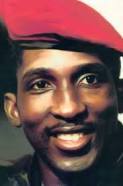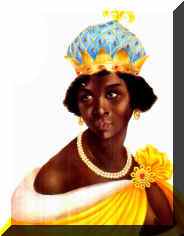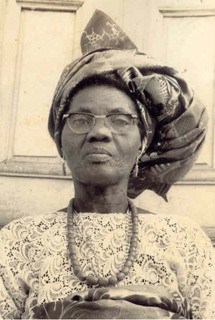|
Thomas Sankara was born on December 21, 1949 in Yako, French Upper Volta, French West Africa, which is modern day Burkina Faso. Sankara attended high-school in a city named Bobo-Dioulasso; after he graduated his parents wanted him to become a Roman Catholic Priest. Sankara entered the military in 1966 at the age of 19, at the age of twenty he was shipped to Madagascar for officer training. While in training he witnessed several uprisings against the government in 1971 and 1972, which would help shape his future. He began reading the works of Carl Marx and Vladimir Lenin; there influence on him would show in his views towards politics. In 1972 Sankara returned home to Upper Volta but his military life would follow, he was involved in a border war against Mali in 1974. His show of military brilliance would earn him fame, but he would later reject his fame and involvement in the war as a result of a paradigm shift. He would become commander of the Commando Training Center in the city of Po. Later that year he would meet Blaise Compaore in Morocco, they would later meet with Henri Zongo and Jean-Baptiste Lingani to form a secret organization the “Communist Officers’ Group.” In 1981 Thomas was appointed Secretary of State for Information in the Military; he would resign in 1982 because he was opposed to the views of the regime. The residing governmental regime was over thrown and Jean-Baptiste Ouedraogo became president of the country. Thomas Sankara was named Prime Minister in January of 1983 but was dismissed in May of 1983. He was also placed under house arrest along with Henri Zongo and Jean-Baptiste Lingani; their arrest would lead to an uprising of the people in Upper Volta. Thomas Sankara became president of Upper Volta in 1983 as a result of a coup d’état which was organized by Blaise Compaoré. As president Sankara was inspired by Fidel Castro, Che Guevara, and Jerry Rawlings. His ideology focused on riding his country of corruption, restoring his country, preventing famine, and promoting education and health. Sankara’s regime suppressed the power of tribal chiefs to receive tribute payment and obligatory labor. In 1984 Sankara renamed the country from Upper Volta to Burkina Faso, which means “the land of the upright people.” He changed the name of the country in the two major languages of the country; he also changed the flag and the national anthem. Sankara made women’s rights one of his priorities; he banned female genital mutilation, forced marriages, and polygamy. He would also appoint women to positions within his government and encouraged them to work outside the home. He would also encourage pregnant women to stay in school. Sankara’s idea was to promote overall equality for men and women within his country. The Sankara led government would be the first African Government to recognize AIDS as a major epidemic to Africa. Sankara became popular with the people of Burkina Faso by making equality between the people and the government a priority. Sankara was named the “African Che Guevara” because he emulated his personal style and politics. In 1987 Thomas Sankara was killed in coup d’état by his colleague Blaise Compaoré who betrayed Sankara. Compaore reversed Sankara’s polices and quickly accepted financial aid from the World Bank. Sankara worked hard to ward off the World Bank and establish a self-sufficient African nation in Burkina Faso. Thomas Sankara was a national hero and a true leader of the people; his sole purpose was to uplift his people at all cost. Governmental leaders who value the people they represent and resist corruption do not exist frequently. Thomas Sankara we proudly stand on your shoulders. J.A. Ward. click below to view the Thomas Sankara Video
0 Comments
In 1583 Anna Nzinga was born to King Kiluanji and her mother Kangela within the Ndongo and Matamba Kingdoms of Angola. She was given the name Nzinga which means to twist or turn, because she was born with her umbilical cord wrapped around her neck. Nzinga’s mother was foretold that Nzinga would become a wise and powerful queen in her future. Her father greatly enjoyed her presence and carried Nzinga everywhere he went. She was able to observe how her father governed the Kingdom; she also was able to accompany her father in war. Nzinga lived during the Atlantic slave trade and her land was being threatened by the Portuguese. One of Nzinga first displays of leadership and superior intelligence was when she accompanied her brother at a peace conference. They were attempting to persuade the Portuguese Governor Mendes de Vasconselos to withdraw the fortress of Ambaca from Ndongo land, return fellow countrymen who had been kidnapped and enslaved, and command the Imbangala mercenaries to cease their services. Nzinga was successful in her pursuits, all of her terms were agreed upon and a peace treaty was created. During the negoations the Portuguese Governor Correia de Sousa offered Nzinga a seat on a floor mat attempting to subordinate her. With royal grace Nzinga declined the floor mat then ordered one of her servants to get on the ground on all fours, and then Nzinga conducted the negations sitting on the back of her servant. The Queens actions showed the governor that she was not lower than he was. Nzinga would later convert to Christianity, it is said that she made the conversion to help strengthen her alliance with the Portuguese. Nzinga and her people would learn that the promises of the Portuguese were empty promises. They did not keep their word despite the negoations and the peace treaty. Cracking under the pressure of the Portuguese, Nzinga’s brother committed suicide and Nzinga became regent of her land because her brother’s son Kaza was too young to rule. In 1641 she aligned with the Dutch to help her fight the Portuguese. She gained a victory over the Portuguese in a battle at Ngoleme in 1644. In 1646 she would gain another victory in a battle at Kavanga. While gaining a victory one of her sisters was captured as well as records of her alliance with the Congo. Her sister was drowned by the Portuguese for her helping correspond with the Congo. Nzinga gained another victory over the Portuguese army with the help of Dutch reinforcements, her next step as to take the Portuguese capital of Masangano. The Portuguese was able to recapture the city of Luanda from the Dutch, which caused Nzinga to retreat to Matamba and continue her resistance from there. Nzinga was able to fight off the Portuguese from capturing her land until she reached her sixties. In 1657 she signed another peace treaty with the Portuguese, after the wars she began to rebuild her nation from years of battle. On December 17th, 1663 Queen Nzinga died at the age of eighty, leaving behind a kingdom weary from battle. After her passing the Portuguese over ran her kingdom eventually taking them over as part of the slave trade. Queen Nzinga was the definition of Beauty, class, wisdom, royalty, courage and leadership. She was able to hold off a superior army and maintain the freedom of her people and their culture. Queen Nzinga gave the Portuguese more than they bargained for, as well as set an example of the power of a woman. Queen Anna Nzinga, we stand on your shoulders. J.A. Ward. Click below to view the Queen Anna Nzinga video On October 25, 1900 Francis Abigail Olufunmilayo Thomas was born in Abeokuta, Nigeria, to parents Daniel Olumeyuwa Thomas and Lucretia Phyllis Omoyeni Adeosolu. Kuti attended grammar school as a child in Abeokuta; she furthered her studies as a teen and young adult in England. As she completed her studies in England she returned home to serve as a teacher in her city. Around January of 1925, she married a man named Reverend Israel Oludotun Ransome Kuti. Mr. Kuti was a noble man who fought for equality for his people and he successfully established the Nigeria Union of Teachers and the Nigerian Union of Students. In 1965 Funmilayo Kuti received a national honor of membership within the Order of Nigeria; the honors were instituted by the National Honors Act No. 5 of 1964, during the Nigerian First Republic to honor Nigerians who have rendered service to the benefit of the nation. In 1968 she received an honorary doctorate of laws from the University of Ibadan. Kuti was a renowned activist and noted educator, as well as a leader within the women’s rights movement along with Elizabeth Adekogbe during the 1950’s. Kuti would also establish a women’s organization for the women in Abeokuta which holds a membership of over 20,000 women from all walks of life. Her next step was to raise public awareness about women’s rights when it comes to unfair pricing towards female merchants, the prices were not even and trade was a major economic component of the city. Kuti started the public protesting against the native authorities and the Alake of Egbaland; she presented the authorities with documents proving abuse by the Alake authorities. The documents proved that the Aleke granted Colonel Suzerain a member of the Government of the United Kingdom, the right to collect taxes. A separate tax rate was given to Nigerian women; as a result of the documents the tax rates were abolished and Colonel Suzerain gave up his position. Kuti founded the Federation of Nigerian Women Societies; the federation would later merge with the Women’s International Democratic Federation. As a long-time member of the National Council of Nigeria and the Cameroons, she advocated strongly for women’s rights. Kuti was subsequently expelled from the organization when she was not elected to a federal parliamentary seat. The spirit and will to fight for human rights earned Kuti an elected seat within the Nigerian House of Chiefs. Kuti was a world traveler but her travels caused the Nigerian Government to question her moves. She visited the USSR, Hungary, and China; because of this her passport was not renewed by her government. Her travels also caused the United States to refuse her entrance into the country. Kuti would later become one of the delegates who negotiated Nigeria’s independence from the British Government. In 1978 Funmilayo Kuti was thrown from a second floor window when her son Fela Kuti’s compound was raided by military personnel. She would later die as a result of her injuries on April 13, 1978. August of 2012, Funmilayo Kuti’s grandson Seun Kuti demanded an apology from the Nigerian government for the death of his grandmother, before they used her likeness on the N5000 Note which is Nigerian currency. Kuti was a dynamic woman who dedicated her life to helping others and fighting injustices, all while raising three remarkable sons. She was brilliant, relentless, fierce and nurturing. She helped make the life easier for Nigerian women by either starting or becoming a part of a number of women rights organizations. Funmilayo Ransome- Kuti, we stand on your shoulders. J.A. Ward. View the Funmilayo Ransome-Kuti video below |
Details
Categories
All
Click Here to join our mailing list
|
Contact Us:Phone:
850-363-1516 Email: mail@ontheshoulders.org Mailing Address: P.O. Box 5442 Tallahassee, FL 32314 |
Connect With Us |
Site powered by PIT Web Design




 RSS Feed
RSS Feed



